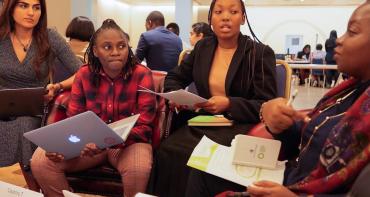Government officials, youth development practitioners and youth leaders pledge to integrate evidence-based approaches into their youth development policies and programming.

Government officials, youth development practitioners and youth leaders representing 12 Commonwealth countries and territories in the Pacific have pledged to integrate evidence-based approaches into their youth development policies and programming.
The commitment came during a technical workshop in Suva, Fiji, from 13-16 June, where 40 officials from government, civil society and the youth sector discussed ways to increase the use of youth indicators and data in the global development agenda.
In a statement published at the conclusion of the workshop, officials recognised young people and evidence-based youth policies as “essential components” of their nations’ development, and called for recognition and investment by Pacific leaders. They also agreed to devise country action plans to strengthen their youth policy development and implementation.
The technical workshop was convened by the Commonwealth Secretariat in partnership with the United Nations Department of Economic and Social Affairs (UNDESA), the United Nations Development Programme (UNDP), the United Nations Educational, Scientific and Cultural Organisation (UNESCO), UN-Habitat, the Secretariat for the Pacific Community (SPC) and the Pacific Youth Council.
Over 60% of the Commonwealth’s entire population is aged under 30, highlighting the need for comprehensive data collection on youth-related indicators and statistics. In 2013, the Commonwealth launched the first-ever Youth Development Index, which identified and analysed key trends in youth development across the Commonwealth. An updated version of the index will be launched in September 2016.
Katherine Ellis, Director of Youth Affairs at the Commonwealth Secretariat, said: “The global focus on the new 2030 Agenda for Sustainable Development provides an opportunity to escalate the commitment to collecting, analysing and using youth-specific data.”
Ms Ellis added: “The need for youth development indicators has been repeatedly highlighted by the Commonwealth, UN agencies and also by young people themselves. Evidence is essential for meaningfully assessing the situation of young people, and for monitoring the progress of youth development over time. That is why we are working to build capacity at national levels to take this forward.”
Over the three-day workshop, participants discussed how national and global policies can be supported by existing youth indicators, shared good practice on youth engagement and participation processes, and developed their capacity to formulate and assess youth development statistics.

Fiji Minister for Youth and Sports, Mr Laisenia Tuitubou, opened the workshop by noting the ‘fundamental importance’ of data on youth development.
He said, “It is only by taking all dynamics into consideration that we can identify the issues associated with youth development…if issues are not being followed up or monitored, then policies and programmes become meaningless, ill-informed and inadequate in tackling the intended problem.”
Participating countries, represented by youth ministry officials, national youth leaders and national statisticians, were: Australia, Cook Islands, Fiji, Kiribati, Nauru, Niue, Papua New Guinea, Samoa, Solomon Islands, Tonga, Tuvalu and Vanuatu.
Ms Charlene Hoff, a Youth Officer from the Cook Islands, highlighted the workshop’s utility in advancing youth development within her country.
She noted, “In the Cook Islands, we now have a new youth policy endorsed by our government and are currently developing our strategic plan. This workshop has given me very useful information about implementing, monitoring and evaluating youth policy. It will definitely help us in the finalisation of our own plan.”
In April 2016, the Commonwealth Secretariat and the youth-led agency Restless Development published a
Photo caption: Delegates at the technical workshop included: youth ministry officials, national youth leaders and national statisticians.



